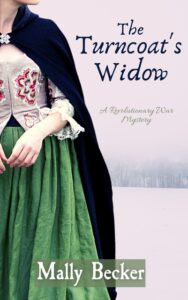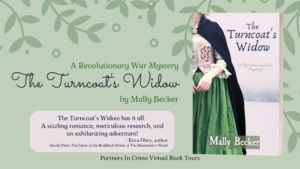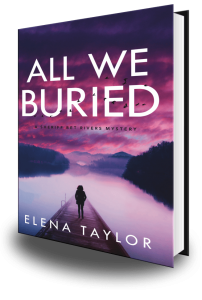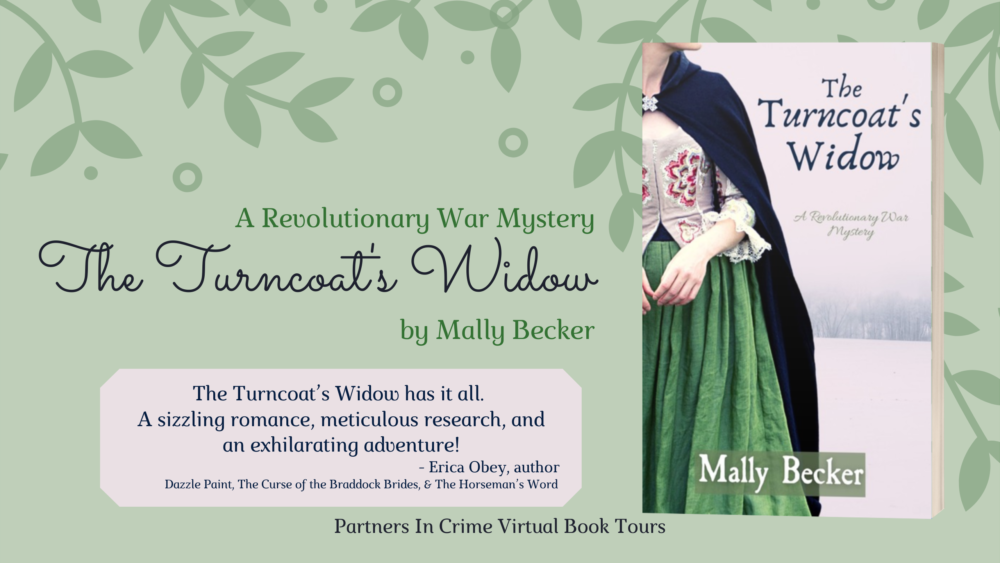The Turncoat’s Widow by Mally Becker
Interview + Excerpt of The Turncoat’s Widow + Book & Author Info + Rafflecopter Giveaway
The Turncoat’s Widow
 Recently widowed, Rebecca Parcell is too busy struggling to maintain her farm in Morristown to care who wins the War for Independence. But rumors are spreading in 1780 that she’s a Loyalist sympathizer who betrayed her husband to the British—quite a tidy way to end her disastrous marriage, the village gossips whisper.
Recently widowed, Rebecca Parcell is too busy struggling to maintain her farm in Morristown to care who wins the War for Independence. But rumors are spreading in 1780 that she’s a Loyalist sympathizer who betrayed her husband to the British—quite a tidy way to end her disastrous marriage, the village gossips whisper.
Everyone knows that her husband was a Patriot, a hero who died aboard a British prison ship moored in New York Harbor. But “everyone” is wrong. Parcell was a British spy, and General Washington – who spent two winters in Morristown – can prove it. He swears he’ll safeguard Becca’s farm if she unravels her husband’s secrets. With a mob ready to exile her or worse in the winter of 1780, it’s an offer she can’t refuse.
Escaped British prisoner of war Daniel Alloway was the last person to see Becca’s husband alive, and Washington throws this unlikely couple together on an espionage mission to British-occupied New York City. Moving from glittering balls to an underworld of brothels and prisons, Becca and Daniel uncover a plot that threatens the new country’s future.
But will they move quickly enough to warn General Washington? And can Becca, who’s lost almost everyone she loves, fight her growing attraction to Daniel, a man who always moves on?
Genre: Historical Suspense / Mystery
Published by: Level Best Books
Publication Date: February 16, 2021
ISBN: 978-1-953789-27-3
To buy The Turncoat’s Widow, click on any of the following links: Amazon || Goodreads
The Turncoat’s Widow—The Interview
The Turncoat’s Widow is set during the Revolutionary War. Tell us about the research you did for your historical novel.
Sometimes research felt like a treasure hunt, especially when I found original documents from the time or tracked down details in person. I attended Revolutionary War reenactments and chatted with reenactors about 18th century cannons, sipped hot chocolate with cayenne pepper in Williamsburg, Virginia, and found a list of the officers who each paid $400 to attend a ball hosted by George Washington. (Yes, $400.)
The cannon, hot chocolate and party all made it into my story!
I searched for information wherever I could find it about women’s lives back then and about how divided our nation truly was at its founding. Books like The Uncertain Revolution and Liberty’s Daughters were tremendously helpful. Because whiskey plays a featured role in my plot, I also read about the history of alcohol in this country. The Forgotten Drinks of Colonial New England was a fun read on that front.
You found an indictment for the Revolutionary War crime of traveling from NJ to NYC during the Revolutionary War “without permission or passport.” What was that document and how did it spark your story?
I thought I’d be clearing trails when I volunteered at the Morristown National Historical Park. Instead, I was put to work sifting through one of the Park’s old collection of letters.
That’s where I found a 240-year-old indictment, or allegation, that a local farmer had committed the crime of traveling to New York City in the middle of the American Revolution “without permission or passport.”
A crime to travel into New York? I’ve lived in New York City or its suburbs all my life. That stopped me in my tracks.
I took the document to one of the Park historians for an explanation. He said that not all colonists supported independence, and there were so many spies and smugglers slipping between New Jersey and British-held New York City, that the local government made travel without its permission a crime.
South of New England, another historian told me, only about 50% of the population may have supported independence.
Spying, smuggling, and a divided nation? With that, my story started to take shape.
Are there parallels between the era the book is set in and today?
Oh, yes. Congress was ineffective. Smallpox and yellow fever outbreaks were the pandemics of the time. Food became almost unaffordable. Farmers resented and distrusted the urban “elites.”
The more I learned about the American Revolution, the more “present” it felt. Our nation was as argumentative, passionate and divided then as it is now. To misquote Lady Gaga, we were born this way. Paradoxically, that makes me an optimist. We survived and (mostly) thrived, despite it all.
How did your prior experiences as a publicist, freelance writer, attorney and advocate for foster children prepare you to launch your first novel?
My role as a volunteer advocate for foster children influenced my story the most.
Most foster kids I’ve met manage to look forward with hope and optimism, despite the trauma they’ve survived. What accounts for that kind of resilience? What makes some of us able to let go of the hurts in our past–big and small–while others can’t?
I didn’t realize how much this question haunts each of the characters you’ll meet in The Turncoat’s Widow until I finished writing my story.
As far as launching the book, nothing in my past prepared me! I’m a “behind the camera” type of person, my sister says. I’m comfortable advocating for clients but less comfortable talking about myself.
Is historical fiction your go-to genre as a reader? Are there specific books or authors that inspired you to write (in any genre)?
On my night table right now are Atomic Love by Jennie Fields, Before We Were Yours by Lisa Wingate, Rules of Civility by Amor Towles and Freedom Lessons by Eileen Sanchez. I guess that means historical fiction is my go-to!
And I love a good historical mystery. Caleb Carr, Lyndsay Faye, and David Liss write mysteries that inspire me and make me feel as if I’m spending time in another time period.
I also love historical mystery authors Ellis Peters, Eleanor Kuhns, Susanna Calkins, Deanna Raebourn, and C.J. Sansom.
How did you come to work with Level Best Books?
A friend and a great mystery author—Tina deBellegarde—had recently signed on with Level Best Books, a crime fiction publisher. She pitched my book to her editor there, then called to say that they were interested in seeing my entire manuscript!
I met the publishers a few years earlier at Malice Domestic, a wonderful mystery fan and writer conference in Maryland, and at Crime Bake, an annual mystery writers conference outside of Boston. I remembered them, and, as it turned out, they remembered me.
And the rest is history! Great to have you here on my blog! Best of luck with your launch.
Excerpt from The Turncoat’s Widow
Chapter One
Morristown – January 1780
There was a nervous rustling in the white-washed meeting house, a disturbance of air like the sound of sparrows taking wing.
Becca Parcell peered over the balcony’s rough, wood railing, blinking away the fog of half-sleep. She had been dreaming of the figures in her account book and wondering whether there would be enough money for seed this spring.
“I didn’t hear what ….” she whispered to Philip’s mother.
Lady Augusta Georgiana Stokes Parcell, known simply as Lady Augusta, covered Becca’s hand with her own. “Philip. They’re speaking of Philip.”
Becca couldn’t tell whether it was her hand or Augusta’s that trembled.
“The Bible says, if thine eye offend thee, pluck it out and cast it from thee, does it not?” The preacher’s voice was soft, yet it carried to every corner of the congregation. “They’re here. Amongst us. Neighbors who toast the King behind closed doors. Neighbors with no love of liberty.”
Philip was a Patriot. He had died a hero. Everyone knew. Minister Townsend couldn’t be talking about him.
The minister raised his eyes to hers. With his long thin arms and legs and round belly, he reminded her of a spider. She twisted her lips into the semblance of a smile as if to say “you don’t scare me.” But he did.
“Which of your neighbors celebrates each time a Patriot dies?” Townsend’s voice rose like smoke to the rafters, took on strength and caught fire. “Their presence here is an abomination.” He rapped the podium with a flat palm, the sound bruising in the quiet church. “Then cast them out. Now.”
Men pounded the floor with their feet.
Becca flinched. It wouldn’t take much to tip the congregation into violence. Everyone had lost someone or something to this endless war. It had been going on for almost five years.
Townsend’s thin arm rose, pointing to her.
Becca’s breath caught.
“And what of widows like Mrs. Parcell? Left alone, no longer guided by the wise direction of their husbands.”
Guided? Becca pulled her hand from Augusta’s. She rubbed her thumb along the palm of her hand, feeling the rough calluses stamped there. She had learned the rhythm of the scythe at the end of the summer, how to twist and swing low until her hands were so stiff that she’d struggle to free them from the handle. She’d fallen into a dreamless sleep each night during the harvest too exhausted even to dream of Philip. She, Augusta and their servant Annie were doing just fine.
“He hardly slept at home, as I hear it,” a woman behind her sniffed to a neighbor.
Becca’s spine straightened.
“No wonder there were no babes,” the second woman murmured.
Becca twisted and nodded a smile to Mrs. Huber and Mrs. Harrington. Their mouths pursed into surprised tight circles. She’d heard them murmur, their mouths hidden by fluttering fans: About her lack of social graces; her friendship with servants; her awkward silence in company. “What else could you expect from her?” they would say, snapping shut their fans.
Relief washed through Becca, nonetheless. This was merely the old gossip, not the new rumors.
“Some of you thought Mr. Parcell was just another smuggler.” The pastor’s voice boomed.
A few in the congregation chuckled. It was illegal to sell food to the British in New York – the “London Trade” some called it — but most turned a blind eye. Even Patriots need hard currency to live, Becca recalled Philip saying.
“He only married her for the dowry,” Mrs. Huber hissed.
Becca’s hand curved into a fist.
Augusta cleared her throat, and Becca forced herself to relax.
“Perhaps some of you thought Mr. Parcell was still a Tory,” the minister said.
The chuckling died.
“He came to his senses, though. He was, after all, one of us,” Minister Townsend continued.
One of us. Invitations from the finer families had trickled away after Philip’s death.
“We all know his story,” Townsend continued. “He smuggled whiskey into New York City. And what a perfect disguise his aristocratic roots provided.” The minister lifted his nose in the air as if mimicking a dandy.
“The British thought he was one of them, at least until the end.” The minister’s voice swooped as if telling a story around a campfire. “He brought home information about the British troops in the City.”
Becca shifted on the bench. She hadn’t known about her husband’s bravery until after his death. It had baffled her. Philip never spoke of politics.
Townsend lifted one finger to his chin as if he had a new thought. “But who told the British where Mr. Parcell would be on the day he was captured? Who told the Redcoats that Mr. Parcell was a spy for independence?”
Becca forgot to breathe. He wouldn’t dare.
“It must have been someone who knew him well.” The minister’s gaze moved slowly through the congregation and came to rest on Becca. His eyes were the color of creosote, dark and burning. “Very, very well.”
Mrs. Coddington, who sat to Becca’s left, pulled the hem of her black silk gown close to avoid contact. Men in the front pews swiveled and stared.
“I would never. I didn’t.” Becca’s corset gouged her ribcage.
“Speak up, Mrs. Parcell. We can’t hear you,” the minister said in a singsong voice.
Townsend might as well strip her naked before the entire town. Respectable women didn’t speak in public. He means to humiliate me.
“Stand up, Mrs. Parcell.” His voice boomed. “We all want to hear.”
She didn’t remember standing. But there she was, the fingers of her right hand curled as it held the hunting bow she’d used since she was a child. Becca turned back to the minister. “Hogwash.” If they didn’t think she was a lady, she need not act like one. “Your independence is a wickedly unfair thing if it lets you accuse me without proof.”
Gasps cascaded throughout the darkening church.
From the balcony, where slaves and servants sat, she heard two coughs, explosive as gun fire. She twisted. Carl scowled down at her in warning. His white halo of hair, fine as duckling feathers, seemed to stand on end. He had worked for her father and helped to raise her. He had taught her numbers and mathematics. She couldn’t remember life without him.
“Accuse? Accuse you of what, Mrs. Parcell?” The minister opened his arms to the congregation. “What have we accused you of?”
Becca didn’t feel the chill now. “Of killing my husband. If this is what your new nation stands for – neighbors accusing neighbors, dividing us with lies – I’ll have none of it. “Five years into this endless war, is anyone better off for Congress’ Declaration of Independence? Independence won’t pay for food. It won’t bring my husband home.”
It was as if she’d burst into flames. “What has the war brought any of us? Heartache, is all. Curse your independence. Curse you for ….”
Augusta yanked on Becca’s gown with such force that she teetered, then rocked back onto the bench.
The church erupted in shouts, a crashing wave of sound meant to crush her.
Becca’s breath came in short puffs. What had she done?
“Now that’s just grief speaking, gentlemen. Mrs. Parcell is still mourning her husband. No need to get worked up.” The voice rose from the front row. She recognized Thomas Lockwood’s slow, confident drawl.
She craned her neck to watch Thomas, with his wheat-colored hair and wide shoulders. His broad stance reminded her of a captain at the wheel. He was a gentleman, a friend of General Washington. They’ll listen to him, she thought.
“Our minister doesn’t mean to accuse Mrs. Parcell of anything, now do you, sir?”
The two men stared at each other. A minister depended on the good will of gentlemen like Thomas Lockwood.
The pastor blinked first. He shook his head.
Becca’s breathing slowed.
“There now. As I said.” Lockwood’s voice calmed the room.
Then Mr. Baldwin stood slowly. Wrinkles crisscrossed his cheeks. He’d sent his three boys to fight with the Continental Army in ’75. Only one body came home to be buried. The other two were never found. He pointed at Becca with fingers twisted by arthritis. “Mrs. Parcell didn’t help when the women raised money for the soldiers last month.”
A woman at the end of Becca’s pew sobbed quietly. It was Mrs. Baldwin.
“You didn’t invite me.” Becca searched the closed faces for proof that someone believed her.
“Is she on our side or theirs?” another woman called.
The congregation quieted again. But it was the charged silence between two claps of thunder, and the Assembly waited for a fresh explosion in the dim light of the tired winter afternoon.
With that, Augusta’s imperious voice sliced through the silence: “Someone help my daughter-in-law. She’s not well. I believe she’s about to faint.”
Becca might be rash, but she wasn’t stupid, and she knew a command when she heard one. She shut her eyes and fell gracelessly into the aisle. Her head and shoulder thumped against the rough pine floorboards.
Mrs. Coddington gasped. So did Becca, from the sharp pain in her cheek and shoulder.
Women in the surrounding rows scooted back in surprise, their boots shuffling with a shh-shh sound.
“Lady Augusta,” Mrs. Coddington huffed.
Independence be damned. All of Morristown seemed to enjoy using Augusta’s family title, her former title, as often as possible.
“Lady Augusta,” she repeated. “I’ve had my suspicions about that girl since the day she married your son. I don’t know why you haven’t sent her back to her people.”
“She has no ‘people,’ Mrs. Coddington. She has me,” Augusta’s voice was as frosty as the air in the church. “And if I had doubts about Rebecca, do you think I’d live with her?”
Becca imagined Augusta’s raised eyebrows, her delicate lifted chin. She couldn’t have borne it if her mother-in-law believed the minister’s lies.
Augusta’s featherlight touch stroked her forehead. “Well done,” she murmured. “Now rise slowly. And don’t lean on me. I might just topple over.”
“We are eager to hear the rest of the service on this Sabbath day, Minister Townsend. Do continue,” Thomas Lockwood called.
Becca stood, her petite mother-in-law’s arm around her waist. The parishioners at the edges of the aisles averted their eyes as the two women passed.
As they stepped into the stark, brittle daylight, one last question shred the silence they left behind: “Do you think she turned her husband over to the British?”
Someone else answered. “It must be true. Everyone says so.
Mally Becker—author of The Turncoat’s Widow
 Mally Becker is a writer whose historical suspense novel, The Turncoat’s Widow, will be published in February 2021 by Level Best Books. She was born in Brooklyn and began her professional career in New York City as a publicist and freelance magazine writer, then moved on, becoming an attorney and, later, an advocate for children in foster care.
Mally Becker is a writer whose historical suspense novel, The Turncoat’s Widow, will be published in February 2021 by Level Best Books. She was born in Brooklyn and began her professional career in New York City as a publicist and freelance magazine writer, then moved on, becoming an attorney and, later, an advocate for children in foster care.
As a volunteer, she used her legal background to create a digest of letters from US Supreme Court Justices owned by the Morristown National Park. That’s where she found a copy of an indictment for the Revolutionary War crime of traveling from New Jersey to New York City “without permission or passport.” It led her to the idea for her story.
A winner of the Leon B. Burstein/MWA-NY Scholarship for Mystery Writing, Mally lives with her husband in the wilds of New Jersey where they hike, kayak, look forward to visits from their son, and poke around the region’s historical sites.
To learn more about Mally, click on her name, photo, or any of the following links: Goodreads, Instagram – @mallybeckerwrites, Twitter – @mally_becker & Facebook – Mally Baumel Becker
a Rafflecopter giveaway
Visit all the stops along the Partners in Crime Virtual Book Tour

02/22 Review @ @ lovemybooks2020
02/23 Showcase @ nanasbookreviews
02/24 Guest post @ Novels Alive
02/25 Showcase @ Im All About Books
02/26 Guest post @ Nesies Place
02/26 Interview @ A Blue Million Books
02/27 Guest post @ The Book Divas Reads
02/27 Review @ Book Reviews From an Avid Reader
02/28 Review @ Geauxgetlit
03/01 Review @ Books, Ramblings, and Tea
03/02 Review @ @ rozierreadsandwine
03/03 Review @ It’s All About the Book
03/03 Showcase @ 411 ON BOOKS, AUTHORS, AND PUBLISHING NEWS
03/03 Showcase @ The Pulp and Mystery Shelf
03/04 Review @ Avonna Loves Genres
03/05 Review @ Lauras Interests
03/05 Showcase @ Eclectic Moods
03/06 Review @ History from a Woman’s Perspective
03/07 Interview @ Author Elena Taylors Blog
03/08 Showcase @ The Bookwyrm
03/09 Review @ Books and Zebras @ jypsylynn
03/10 Review @ The Book Connection
03/11 Interview/showcase @ CMash Reads
03/12 Showcase @ Archaeolibrarian – I Dig Good Books!
03/15 Review @ Quiet Fury Books
03/16 Showcase @ Celticladys Reviews
03/18 Review @ A Room Without Books is Empty
03/19 Review @ Just Reviews
 Elena Taylor is the author of All We Buried, available now in print, e-book, and audio book format at all your favorite on-line retailers. And don’t forget many independent bookstores can order books for you and have them shipped to your home or for curbside pickup.
Elena Taylor is the author of All We Buried, available now in print, e-book, and audio book format at all your favorite on-line retailers. And don’t forget many independent bookstores can order books for you and have them shipped to your home or for curbside pickup.
For more information on All We Buried, click on the link here to visit the home page.


I have this book on my list as I have never read a book in this time period.
Such a fascinating time period to set a novel!